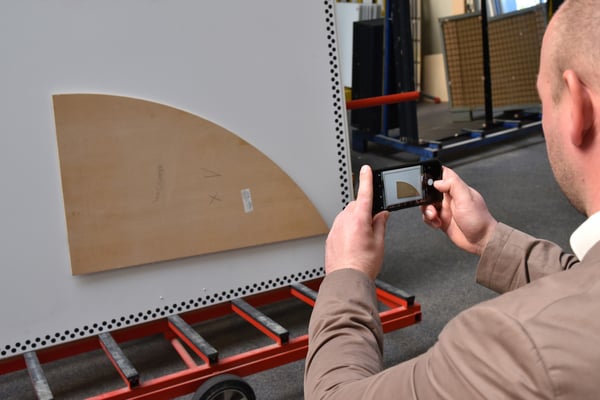The term Internet of Things (IoT) is bantered about multiple different industries. What does the term actually mean? According to Merriam-Webster, IoT is “the networking capability that allows information to be sent to and received from objects and devices (such as fixtures and kitchen appliances) using the Internet.” For glass companies, this means implementing smart, automated and connected equipment and software solutions from the factory floor to the front office to the jobsite.
Breaking Down IoT
Besides being intimidating, IoT can also be complicated, confusing, and expensive. However, implementing IoT into your glass factory really is something you can do! Each step you take to implement IoT is one closer to a fully integrated glass factory ready to meet the challenges of Industry 4.0. To meet these challenges, let’s break down several ways IoT will affect your glass factory.
Inventory Tracking and Management
IoT can transform how companies track and manage their inventory. As glass fabricators, you store and track hundreds to thousands of different sheets of glass on a daily basis. Harnessing big data so it works for you is the key to tracking and managing your inventory correctly. By harnessing big data, you can analyze every aspect of your business from inventory and sales to production and delivery. These insights can show you both the strengths and weaknesses in your process. No matter the size of your company or how many sites you operate, data analytics provides the logic to make informed decisions to improve processes and profitability. For example, as software evolves, it will help you manage and reorder supplies and glass inventory when needed.
Smartphones
The ubiquitous smartphone is changing how factories operate. Currently, many of you use industrial scanner, but gone are those days. By utilizing smartphones, users replace specialized, expensive hardware with familiar mobile devices used daily. This means less training. Smartphones can also be used to photograph stencils and email them to production, who can convert them into CAD files. By using a smartphone in this way, you can shorten the time from dream to delivery for your customers.
Sensors & Predictive Maintenance
Sensors placed strategically on the factory floor can allow you to track and trace each individual sheet or batch along the entire production chain. No more time-consuming searching of documents, e-mails, scans, photos, customer notes, etc. because they are linked to the order and displayed automatically within your production or business software.Constant communication between different productive elements of your factory from the floor to the front office allows for greater collaboration and productivity on multiple levels.
As sensors collect data, they can assist in spotting equipment maintenance needs, for example. Product manufacturers can utilize information from these sensors to predict wear and repair needs. It is thought that predictive maintenance could save some companies up to 40% in maintenance costs as well as unplanned downtime.
Speed, Reliability, Accessibility, & Efficiency
Speed is a vital aspect of consumer satisfaction in this post-Amazon world. However, speed is of little use without reliable data that is also accessible. When data is reliable, accessible, and quick to retrieve, it makes your job as a glass fabricator more efficient. With each IoT development, you and your workers will be able to accomplish larger-scale tasks in less time and with greater precision. Because of this, you might also need few workers, which can help you address the current worker shortage.
Automation & Worker Shortage
Did someone say worker shortage? IoT will take current automation standards to the next level. For example, the glass industry is a cyclical industry with high- and low-demand months. As IoT evolves, your factory network could increase or decrease production based on trends spotted through orders, sales volume, website traffic, or something else. This real-time data can then influence employee schedules, inventory orders, delivery dates, shipping routes, etc.
E-Commerce
Customers—due to the “Amazon effect”—demand flexibility and transparency during their buying process. E-Commerce software can sit on top of your existing ERP system, pull data, and display feature-rich graphics that include a self-service capability, which gives customers direct control when ordering. Through web-enabled access and a simple, step-by-step user format, e-commerce software makes it easy and more convenient for your customers to do business 24/7 with you …on any device…from anywhere they choose.
Storing in the Cloud
Maybe not the smallest step but an effective one, storing on the cloud allows for easier access to data by everyone at any company site or remote. By storing on the cloud, company sites can turn a one-site project into a collaborative effort, for example. Cloud storage can also enable workers to share solutions between sites, increasing efficiency and saving time.
Data Security
Currently we work in a data-rich environment with more and more data at our fingertips. With so much data available, business owners should ask themselves where this data will be stored, how it will be stored, and how secure it will be. Security is essential to prevent thieves (i.e., hackers) from stealing the data. Work with a trusted industry leader in glass software and data storage to develop an action plan for your business.
Conclusion
IoT devices will have a significant impact on many aspects of the manufacturing process. You can either ignore IoT and be left behind, or you can figure out how to apply IoT to your glass factory. With the right software partner, plans, and steps, you can overcome the IoT intimidation factor to develop your glass factory of the future.
In the meantime, you can check out several of A+W's IoT software solutions:


